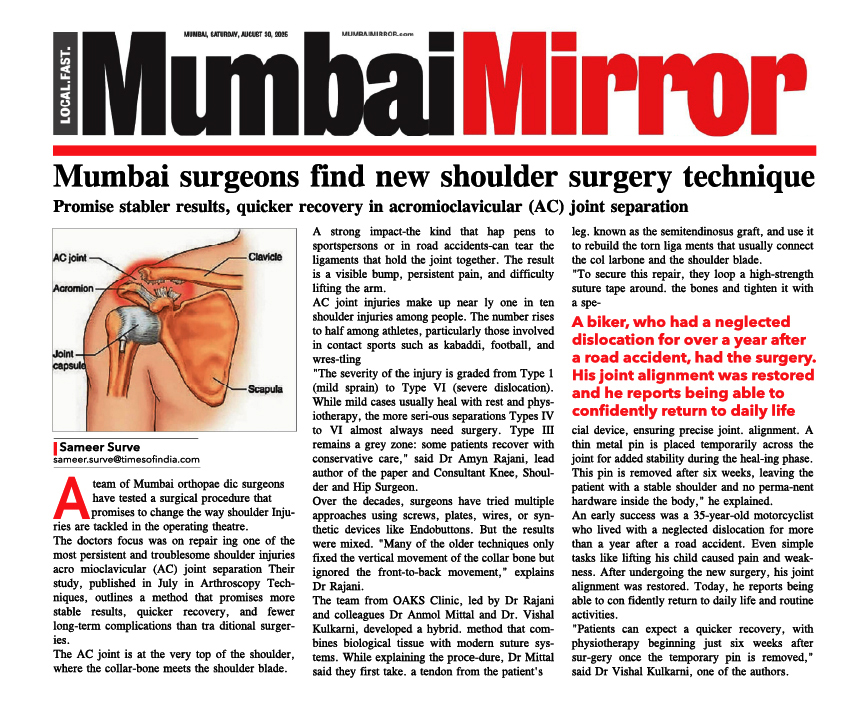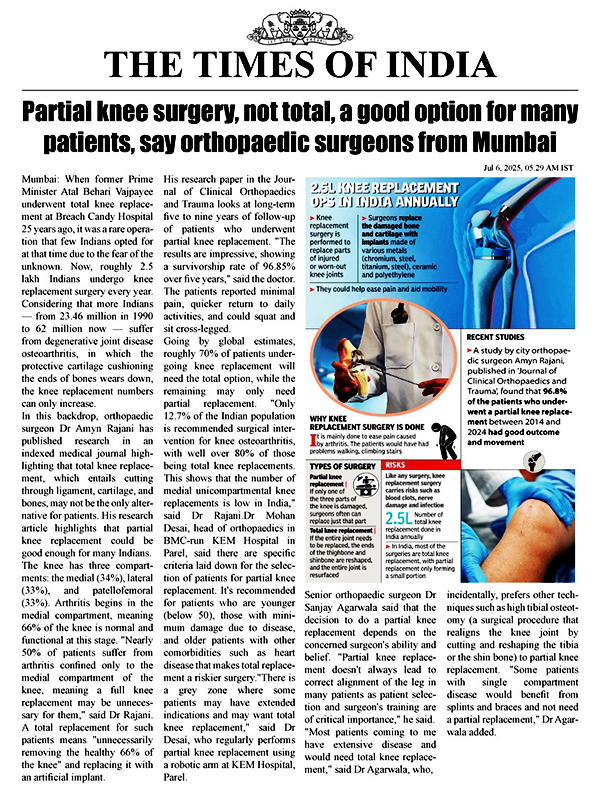A sharp twist, a sudden pivot, a forceful impact – these are just a few ways a meniscus tear can occur. For athletes and active individuals, this common knee injury can sideline them and cause significant pain and discomfort. But beyond the immediate pain and limitations, many wonder about the long-term consequences. A crucial question that often arises is: Is your meniscus tear leading to arthritis?
This comprehensive guide will delve deep into the intricate relationship between meniscus tears and the development of knee arthritis. We'll explore the anatomy of the meniscus, how tears occur, the mechanisms by which they can contribute to arthritis, the symptoms to watch out for, and the available treatment options, including the expertise of an experienced orthopaedic doctor in Mumbai and the role of arthroscopic knee surgery in Mumbai performed by a skilled knee arthroscopic surgeon in Mumbai.
Understanding the Vital Role of the Meniscus
Nestled within your knee joint are two C-shaped wedges of cartilage called menisci – the medial meniscus on the inner side and the lateral meniscus on the outer side. These seemingly simple structures play several critical roles in maintaining healthy knee function:
- Shock Absorption: The menisci act as cushions, absorbing the impact and stress placed on the knee joint during activities like walking, running, and jumping. They distribute weight evenly across the joint surfaces, preventing excessive pressure on the underlying articular cartilage.
- Stability: They contribute to the stability of the knee joint, especially during movement and rotation. Their wedge shape helps to deepen the socket of the knee joint, providing a better fit between the femur (thigh bone) and the tibia (shin bone).
- Lubrication and Nutrition: The menisci aid in the distribution of synovial fluid, the lubricating fluid within the knee joint. This fluid nourishes the articular cartilage, keeping it healthy and functioning smoothly.
- Proprioception: They contain nerve endings that provide feedback to the brain about the position and movement of the knee joint, contributing to our sense of balance and coordination.
How Meniscus Tears Occur
Meniscus tears are common injuries, particularly among athletes involved in sports that involve twisting, pivoting, and sudden stops. However, they can also occur due to degenerative changes in the cartilage as we age, making the meniscus more susceptible to tearing with even minor trauma. Common causes of meniscus tears include:
- Sudden Twisting or Pivoting: This is a frequent mechanism of injury in sports like football, basketball, and soccer.
- Direct Impact: A direct blow to the knee, such as during a tackle, can cause a tear.
- Heavy Lifting: Lifting heavy objects with a bent knee and a twist can strain the meniscus.
- Degenerative Changes: Over time, the meniscus can weaken and become more prone to tearing due to wear and tear. Even simple activities like standing up from a squat can cause a tear in a degenerated meniscus.
How Meniscus Tears Occur
Meniscus tears are common injuries, particularly among athletes involved in sports that involve twisting, pivoting, and sudden stops. However, they can also occur due to degenerative changes in the cartilage as we age, making the meniscus more susceptible to tearing with even minor trauma. Common causes of meniscus tears include:
- Sudden Twisting or Pivoting: This is a frequent mechanism of injury in sports like football, basketball, and soccer.
- Direct Impact: A direct blow to the knee, such as during a tackle, can cause a tear.
- Heavy Lifting: Lifting heavy objects with a bent knee and a twist can strain the meniscus.
- Degenerative Changes: Over time, the meniscus can weaken and become more prone to tearing due to wear and tear. Even simple activities like standing up from a squat can cause a tear in a degenerated meniscus.
The Link Between Meniscus Tears and Arthritis - A Cascade of Events
While not every meniscus tear inevitably leads to arthritis, it significantly increases the risk and can accelerate its development. Here's how a torn meniscus can contribute to this degenerative joint condition:
- Loss of Shock Absorption: When the meniscus is torn, its ability to effectively absorb shock and distribute weight is compromised. This leads to increased stress and pressure on the articular cartilage, the smooth, protective layer covering the ends of the bones in the knee joint.
- Increased Friction and Wear: The uneven distribution of pressure caused by a torn meniscus can lead to increased friction between the femur and tibia. This excessive rubbing can damage and wear down the articular cartilage over time.
- Inflammation and Degradation: The injury to the meniscus triggers an inflammatory response within the knee joint. Chronic inflammation can release enzymes and other substances that further degrade the articular cartilage.
- Altered Biomechanics: A torn meniscus can alter the normal biomechanics of the knee joint, leading to abnormal movement patterns and increased stress on specific areas of the cartilage.
- Fragmented Meniscus: In some cases, a torn piece of the meniscus can become lodged within the joint, causing further irritation and damage to the articular cartilage as it moves around.
Over time, the progressive damage to the articular cartilage leads to osteoarthritis, a degenerative joint disease characterized by pain, stiffness, swelling, and reduced range of motion.
Recognizing the Symptoms - When to Seek Help
It's crucial to be aware of the symptoms that might indicate a meniscus tear and to seek timely medical attention to potentially mitigate the long-term risk of arthritis. Common symptoms of a meniscus tear include:
- Pain: Often felt along the joint line, the pain can range from mild to severe and may worsen with activity.
- Swelling: Fluid buildup in the knee joint is common after a meniscus tear.
- Stiffness: Difficulty bending or straightening the knee.
- Clicking or Popping: You might hear or feel a clicking or popping sensation in the knee, especially during movement.
- Locking or Catching: The knee might feel like it's catching or locking, making it difficult to move.
- Giving Way: A feeling that the knee is unstable and might give way, especially during weight-bearing activities.
If you experience any of these symptoms, it's essential to consult an orthopaedic doctor in Mumbai for a thorough evaluation and diagnosis.
Diagnosis and Treatment Options - Addressing the Tear and Preventing Arthritis
A skilled orthopaedic doctor in Mumbai will typically diagnose a meniscus tear through a physical examination, reviewing your medical history, and potentially ordering imaging studies such as X-rays (to rule out other conditions) and MRI (Magnetic Resonance Imaging), which is highly effective in visualizing soft tissues like the meniscus.
Treatment options for a meniscus tear depend on several factors, including the size, location, and pattern of the tear, as well as your age, activity level, and overall health.
- Conservative Management: For smaller tears, particularly in the outer "red zone" of the meniscus (which has a good blood supply and healing potential), conservative treatment may be recommended. This can include rest, ice, compression, elevation (RICE protocol), pain medication, and physical therapy to strengthen the surrounding muscles and improve stability.
- Arthroscopic Knee Surgery: For larger tears, tears that cause persistent symptoms, or tears in the inner "white zone" (which has poor blood supply), arthroscopic knee surgery in Mumbai may be necessary. This minimally invasive procedure is performed by a knee arthroscopic surgeon in Mumbai using small incisions and a tiny camera (arthroscope) to visualize the inside of the knee joint. The surgeon can then repair the tear (if possible) or remove the damaged portion of the meniscus.
The Role of Early Intervention: Addressing a symptomatic meniscus tear, especially through surgical repair when appropriate, can potentially reduce the long-term risk of developing knee arthritis. By restoring the integrity and function of the meniscus, the stress on the articular cartilage can be minimized.
Living with a Meniscus Tear - Strategies for Prevention and Management
Even with treatment, individuals who have experienced a meniscus tear should take steps to protect their knee joint and minimize the risk of future problems, including arthritis:
- Maintain a Healthy Weight: Excess weight puts additional stress on the knee joints.
- Strengthen Supporting Muscles: Strong quadriceps, hamstrings, and calf muscles provide stability and support to the knee.
- Proper Exercise Technique: Ensure you are using correct form during physical activities to avoid unnecessary stress on the knees.
- Low-Impact Exercise: Engage in activities like swimming, cycling, or walking, which are gentler on the joints.
- Listen to Your Body: Avoid activities that cause pain and allow adequate time for recovery after exercise.
- Consider Orthotics: Shoe inserts can help to improve alignment and reduce stress on the knee joint.
- Regular Follow-Ups: Continue to see your orthopaedic doctor in Mumbai for regular check-ups to monitor your knee health.
Conclusion - Proactive Care for Long-Term Knee Health
While a meniscus tear doesn't automatically guarantee the development of arthritis, it undeniably increases the risk. Understanding the biomechanical consequences of a torn meniscus and seeking timely and appropriate treatment from a qualified knee arthroscopic surgeon in Mumbai is crucial for mitigating this risk. Whether through conservative management or arthroscopic knee surgery in Mumbai, addressing the tear and adopting proactive strategies for knee health can significantly improve your long-term joint health and help you stay active for years to come. If you're experiencing knee pain or suspect a meniscus tear, don't delay in consulting an experienced orthopaedic doctor in Mumbai to discuss your options and take the first step towards preserving your knee health.
Seek Expert Care with Dr. Amyn Rajani
For residents of Mumbai and beyond experiencing knee issues, including meniscus tears, seeking the expertise of a renowned orthopaedic doctor in Mumbai is paramount. Dr. Amyn Rajani stands out as a highly skilled and experienced knee arthroscopic surgeon in Mumbai, specializing in the diagnosis and treatment of a wide range of knee conditions. With a commitment to providing patient-centric care and utilizing the latest advancements in arthroscopic knee surgery in Mumbai, Dr. Rajani can offer comprehensive solutions, from accurate diagnosis to effective treatment plans tailored to your individual needs. Whether you require conservative management or are a candidate for minimally invasive surgical intervention, consulting with Dr. Rajani can provide you with the expert guidance necessary to address your meniscus tear and take proactive steps towards preserving your long-term knee health and overall well-being in Mumbai.





